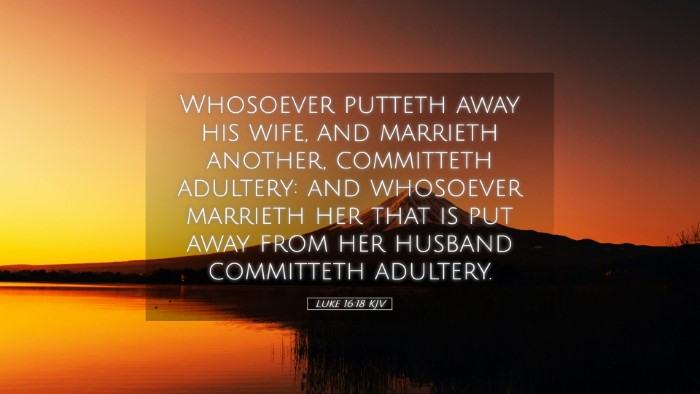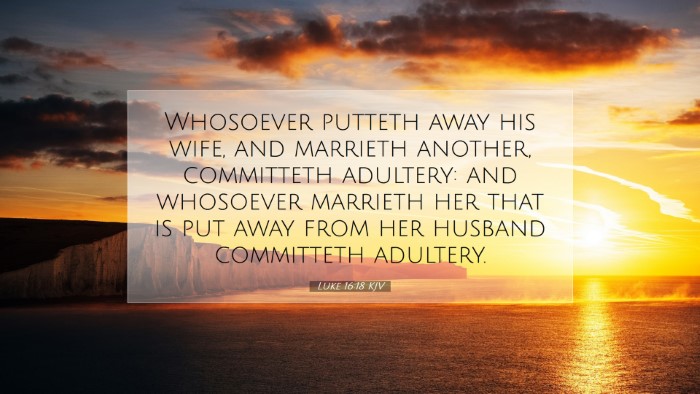Commentary on Luke 16:18
Luke 16:18 states, "Everyone who divorces his wife and marries another commits adultery, and he who marries a woman divorced from her husband commits adultery." This verse, embedded in Jesus' teaching on wealth and moral conduct, has profound implications for understanding the sanctity of marriage and the seriousness of divorce.
Context of the Passage
To better appreciate the weight of this verse, we must consider its context. Luke 16 contains parables that address the right use of earthly resources and the attitudes that accompany wealth. Jesus often contrasted the values of His kingdom with those of the world, and in this passage, He addresses the moral implications of personal relationships and marriage.
Interpretation and Insights
Matthew Henry's Perspective
Matthew Henry emphasizes the seriousness Jesus places on marriage. He notes that this verse highlights God's original design for marriage as a lifelong covenant. Henry articulates that divorce was permitted by Moses due to the hardness of hearts, but Jesus seeks to restore marriage to its intended sanctity. He writes, "The design of marriage is not only for mutual help but also for mutual holiness."
Albert Barnes' Commentary
Albert Barnes elaborates on the notion of adultery as it pertains to divorce and remarriage. He underscores that the act of remarriage after a divorce—when ungrounded in biblical justification—constitutes adultery. Barnes notes that Jesus is reaffirming the law while heightening its ethical demand, suggesting, "Divorce and remarriage are not to be taken lightly; they are serious breaches of the marital covenant."
Adam Clarke's Insights
Adam Clarke provides an in-depth exploration of the cultural implications of divorce during Jesus’ time. He points out that Jewish law permitted divorce, yet Clarke argues that Jesus subverts this by stating that any cause of divorce—except for adultery—leads to ongoing adultery through remarriage. He illustrates that Jesus calls for a higher standard, emphasizing, "Jesus' declaration challenges societal norms, urging fidelity and commitment in marriage."
Theological Reflection
This passage lends itself to several theological reflections:
- The Nature of Marriage: Understanding marriage as a sacred covenant reflects God’s relationship with His people. It requires mutual respect, love, and ultimately, a commitment that mirrors divine fidelity.
- The Consequences of Divorce: The notion of divorce and its consequences indicates how seriously God views marital fidelity. The emphasis on adultery connected to remarriage serves as a warning against casual attitudes toward divorce.
- Grace and Redemption: While the text places high demands on marital fidelity, it also compels the church to respond with grace. Pastoral care and the opportunity for restoration must be considered, recognizing that the gospel calls for reconciliation, not condemnation.
Practical Application
For pastors and leaders, this passage serves as a basis for teaching about the sanctity of marriage, urging couples to consider their commitments seriously. It also emphasizes the importance of providing pastoral care for those who have experienced divorce, offering a balance between truth and grace.
1. Teach the Sanctity of Marriage
Educate congregants on the biblical view of marriage as a covenant designed by God. Encourage premarital counseling to instill a deeper understanding of commitment.
2. Provide Support for the Divorced
Recognize the pain and complexity surrounding divorce. Create a church environment where healing and support are available for those navigating the aftermath of marital discord.
3. Foster Reconciliation
Promote reconciliation strategies within the church. Highlight the transformative power of forgiveness, signaling that restoration can be pursued, even after betrayal or failure.
Conclusion
Luke 16:18 encapsulates the severe consequences of divorce and the call to fidelity within marriage. Insights from Matthew Henry, Albert Barnes, and Adam Clarke collectively underscore that while divorce may be permissible in specific circumstances, it should never be considered lightly. The church's role is to uphold these truths while embodying grace, forgiveness, and reconciliation.


